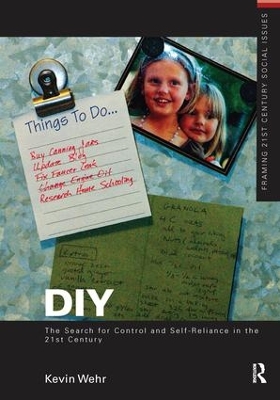Framing 21st Century Social Issues
3 total works
This short text, ideal for Social Problems and Criminal Justice courses, examines the American prison system, its conditions, and its impact on society. Wehr and Aseltine define the prison industrial complex and explain how the current prison system is a contemporary social problem. They conclude by using California as a case study, and propose alternatives and alterations to the prison system.
DIY: The Search for Control and Self-Reliance in the 21st Century
by Kevin Wehr
From the driveway mechanic to the backyard gardener, many diverse people are "doing it themselves" by building or repairing the stuff of their daily lives without the aid of experts. Do It Yourself uses Habermas’s colonization of the lifeworld as a frame and mobilizes Marx’s concepts of alienation and mystification to examine how social behaviors can be a conscious reply to a complex and fast-moving world, a nostalgia for simpler times past, or a just an economic impulse. Each main chapter is anchored by an extended empirical example: back-to-the-land, home-schooling, and self-government.
How Ethical Systems Change: Abortion and Neonatal Care
by Sheldon Ekland-Olson and Elyshia Aseltine
Roe v. Wade came like a bolt from the blue, but support had been building for years. For many, the idea that life in the womb was not fully protected under the Constitution was simply not acceptable. Political campaigns were organized and protests launched, including the bombing of clinics and the killing of abortion providers. Questions about the protection and support of life continued after birth. This book is based on a hugely popular undergraduate course taught at the University of Texas, and is ideal for those interested in the social construction of social worth, social problems, and social movements.
This book is part of a larger text, Who Lives, Who Dies, Who Decides?, http://www.routledge.com/books/details/9780415892476/


